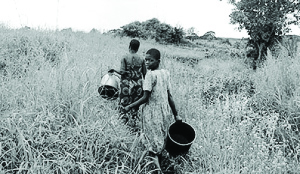By CHILA NAMAIKO –
IMAGINE what would the world be like if we had no water…life would be a misery because water is a crucial element in life, it’s what keeps us alive and brings us many pleasures in life.
Mary Sinalibamba, a mother of six children in Kauba Village, Pemba District wakes up every day at 04:00 hours to walk a distance of five kilometres with her children carrying different sizes of containers on their heads to fetch water from an old borehole sunk during 1990s.
She walks through across a thick forest on a small path with long grasses on both sides and all she hears are melodious sounds of hyenas and birds because it is dawn, but she is not worried because she has to hurry to be first in the queue at the borehole.
As she reaches, she finds over 10 other women jostling around with empty buckets while others are dozing in the queue because they woke up before her. She joins them but only manages to get water after 06:00 hours because it comes out from the borehole at a snail’s pace.
By the time she returns home, it is 07:30 hours and she has to do many other chaos such as cooking for her family, but she does not forget to set the alarm at night before she retires to bed so she could wake up early to fetch water from the same borehole.
“Water is important but where we fetch it from is very far. If you want to be the first one at the borehole, you have to wake up around 04:00 hours and by the time you are coming home it’s after 07:00 hours and we get tired,” she said in an interview recently in Pemba recent.
Ms Sinalibamba is a typical example of many other people particularly those residing in remote areas of Zambia who still face challenges to get clean drinking water due to inadequate sources as in some cases water sources such as boreholes are either old or broken down.
In Pemba a newly created district in Southern Province, it is an open secret that water supply in the urban district has been poor as residents only received water for an average of six hours per day.
The residents have for many years been experiencing critical shortages of supply and access to clean drinking water for both domestic usage and their livestock.
Government, however, has come to their aid by sinking 15 new boreholes fixed with hand pumps in selected rural areas such as Kaiya, Maambo, Habunkululu and Kauba wards at a cost of K490 million.
This project has benefited 3,750 people and this year the Ministry of Local Government and Housing would further provide support of minimum of 10 boreholes in Pemba, one of the newly created districts after Chikankanta and Zimba.
While Zambia is making tremendous progress on providing clean and safe drinking water whose average national coverage stands at about 82 per cent, the country still lags behind in adequate sanitation whose estimated national coverage is 43 per cent.
Government, in its developmental agenda, recently awarded a contract to Njovu Enterprises limited to install the K5 million district water supply project whose scope of construction include a new surface water abstraction facility and a new water treatment plant.
Others are installing 200 millimetre water main line with a total length of 5,200 metres to deliver treated water from the new treatment plan to the entire Pemba town, rehabilitation of the existing old and dilapidated water supply network and repairing of all th







